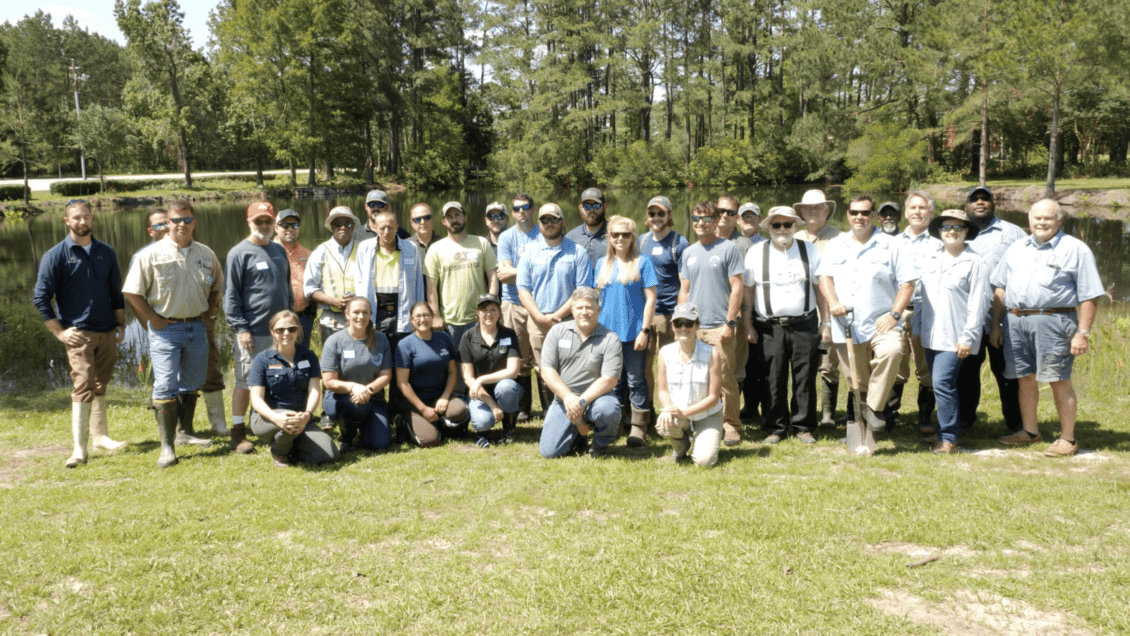FLORENCE — With more than 20,000 ponds in South Carolina’s eight coastal counties alone, there’s no shortage of need for education about how they affect the state’s natural resources and water quality.
[vid origin=”youtube” vid_id=”euTuJ1SCXlU” size=”medium” align=”right”]
But when one considers the myriad of uses these ponds have, the variety of expertise needed for their proper management multiplies exponentially.
That’s why Clemson Extension’s Master Pond Manager program is divided into two specific tracks — one for stormwater ponds; one for recreational ponds — and also why the hybrid course combines online classroom learning with hands-on field days aimed at equipping participants to put their knowledge into action on their own ponds.
“Ponds are a fixture in our landscape and we use them for irrigation, recreation, stormwater management; so it’s important to manage these ponds for their function and use in the community,” said Guinn Wallover, water resources Extension agent and Master Pond Manager coordinator. “But these ponds are also connected to our ecosystems — they’re going to drain ultimately to the nearest creek, stream or other waterway — and it’s important that we try to manage these ponds to protect that downstream impact as well.”
Master Pond Manager program participants at field days at Francis Marion University and Moore Farms Botanical Garden put their classroom knowledge into action with hands-on learning about such topics as dam maintenance, fish management, stormwater pond design and maintenance, and best management practices led by Clemson Extension experts.
Heath Coggins, who owns pond management company Landscape Accents, enrolled in the program not only to increase his knowledge of stormwater ponds, but also to learn more about maintaining recreational ponds.
“It’s important for what we do because on a daily basis we’re maintaining stormwater ponds, so it’s just natural to want to learn more about what we’re doing and make sure we’re doing it right,” Coggins said. “First off, it will give us more confidence in what we’re doing, and we feel like we’ll be able to provide our customers with better service and we also have valuable contacts that we meet through Clemson Extension. It’s great because I have many questions that I can ask these guys in person, feel confident about what they tell me and have good solutions to go home to and put them into practice.”
For one pond owner, Ken Winters, whose family owns a large lake in Spartanburg, enrolling in the program helped him do exactly that.

“Taking this class affects me on a daily basis,” Winters said. “I take the course online, go out my back door to my lake and I can say, ‘Ah, that’s what’s going on here.’ Whereas before the class I could only guess what was actually happening in my own lake. My lake has a lot of organic matter in it and we have beaver and muskrat in the area, and short of taking this course, I would know nothing about how to take care of my own lake.”
Winters said he is a recent transplant to South Carolina, and the course also helped to give him the local knowledge necessary to manage a pond in this region.
“Where I moved from, I knew everything about the rocks, the plants and (in South Carolina) it was all new to me and I felt out of my element, so I thought the best way would be to go to school,” he said. “It’s important to know about what’s going on around you, for me, because I feel responsible for that lake and the dam that’s impounding the water in it.”
Water Resources Extension agent Sarah Rogers, who is based in Pee Dee region, said the program’s dual tracks provide useful educational experiences for recreational pond owners while also increasing awareness about stormwater in general and offer solutions for stormwater pollution.
“Pond management is a really vital part of the protection of our local waterways, especially stormwater ponds,” Rogers said. “A lot of people don’t realize how much runs off and can get into our ponds and drains into our waterways eventually, so a lot of that behavior takes education to recognize what’s going on. A course like this gives pond owners and professionals the tools to be able to identify problems and treat ponds in a really effective way.”
“What’s exciting about Master Pond Manager is it’s had a reach beyond South Carolina,” Wallover said. “We’ve had participants take the class from Texas, Maryland, Connecticut and Washington state. And so while the class is designed through Clemson Extension and offered for South Carolina, it’s really serving more as like a national model for pond management outreach in the United States.”
To be notified of future offerings of Master Pond Manager, please email Wallover.
Get in touch and we will connect you with the author or another expert.
Or email us at news@clemson.edu

